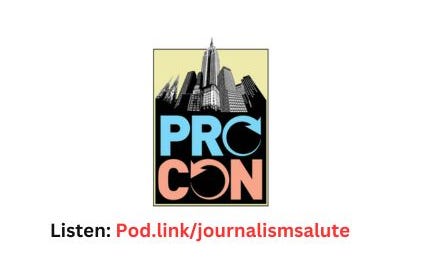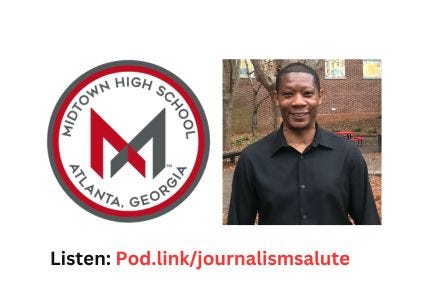New Episodes: The Students and The Teacher
Highlights from our recent interviews with eight (hopefully) future journalists and a teacher with great dedication to his craft
This week's newsletter highlights two episodes. One covers our second trip to the College Media Association national convention in New York a couple weeks ago. There, we spoke to eight journalism students about their interests and how journalism has impacted them as people.
How has being a journalist shaped your worldview
I specialize in arts and culture journalism, so it's been really cool to go to different events happening in Richmond. My worldview has also been shaped through art. I see all the different types of art that I'm writing about and getting the meaning from the people who make it.
What's the most valuable lesson you've learned in your time as a journalist.
Listening. It's all around you, whether in a formal interview or just listening to what's happening on your morning commute. That's how you find stories.
How has being a journalist shaped your worldview?
I'm from a pretty diverse area (Worthington, Ohio) but I think stepping out of my comfort zone was hard. Being a journalist has really pushed me to step out of my comfort zone and just try and experience what other people experience so that I can see their viewpoint on the world.
Do you remember what it was like when you were learning to be able to interview people?
It's scary at first, especially because you don't want to mess up anyone's story. It's their story to tell and you don't want to change anything. The raw story itself has so much to say. When you have someone who has such a powerful message, that's all you need to make a great story. I just wrote about Passion Works Studio and its founder Patty Mitchell. She works really hard to create this space for people with developmental differences and gives them a place to work, a place of kindness and love. It was amazing to hear about why she wanted to create this place.
What's your favorite part about being a sportswriter?
Every athlete on these teams, they're all from different places around the country. So it's cool getting to know the backstories. Everyone is so different even though they play the same sport. There's always stories layered beneath stories.
How has being a sports journalist shaped your worldview?
It really does underscore the amount of different points of views and perspectives. Somebody could see one thing a certain way and a different person could see it differently. It's just a big reflection of our points of view, our upbringing, and the diversity of the world.
What's the hardest part of being a theatre critic?
If I'm doing a review and if I dislike (the thing I'm reviewing) that's the hardest part, just because I don't know how to gracefully say that something wasn't good. But at the end of the day, people are reading reviews because they want the truth and journalism is telling the truth.
Nikki Yunker (El Camino College)
What's the most valuable lesson you've learned in being a journalist?
Journalism has let be more involved with the world. I don't think there's anything better than that. Journalism makes the world come alive. I'm a paralegal studies and studio arts major, but journalism is so interdisciplinary. It applies to everything in life. I hope to be able to incorporate the skills that I've gained for the rest of my life.
The second episode covers our interview with Del Ellerton, a high school journalism teacher in Atlanta who has also worked at the Atlanta Journal-Constitution and Bloomberg News. Del talked about his teaching experience and how his school's journalism program works.
Del Ellerton (Midtown High School, Atlanta)
On preparing his students
In Journalism 1, the first month of my classes covers ethics and fairness. That's a foundation I want to lay because a lot of these controversial stories, it's easy to take a sensational angle. But you've got to think about how this is going to affect people. Tread lightly in your approach to covering a story. Make sure you cover all angles. Make sure you're fair. Make sure you're balanced.
What do people need to know about high school journalism teachers that they might not already know?
They don't know how hard we work, all these different hats you have to wear. You have to stay up on different trends and how journalism is changing. It's a constantly changing landscape and you have to keep up with what's going on in the professional world. You do have kids that go into journalism. One of my students from my first year is at NPR and we have students who are editors at college papers.
You were a journalism advisor and head football coach at the same time for a couple of years. You said that journalism helped you with coaching and vice versa. How so?
I had not done anything remotely related to coaching football in 17 years. And even 17 years ago, I was only the defensive backs coach at the middle school I taught at. So I had no experience coaching high school football.
I liken it to journalism because if you have like a major breaking story that you're just struck into the middle of it, you've got to go in and you've got to quickly assess. You've got to make sense of it.
The first thing I had to do. I didn't know the coaches because they're not my track coaches. I had to go in. I had to get to know the coaches. I had to understand what they're doing with the offense, what they're doing with the defense. I had to make assessments and you do the same thing when you have these major stories.
You've got to figure out what the angle, who do you need to talk to? How do you organize things? I had that same organizational demand with football.





